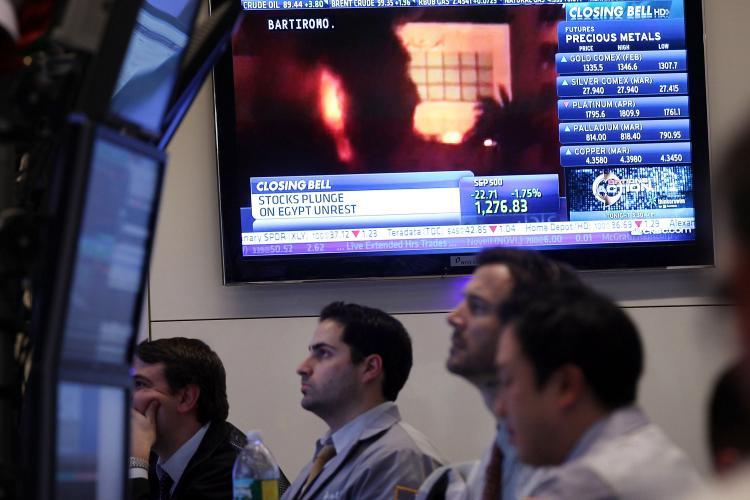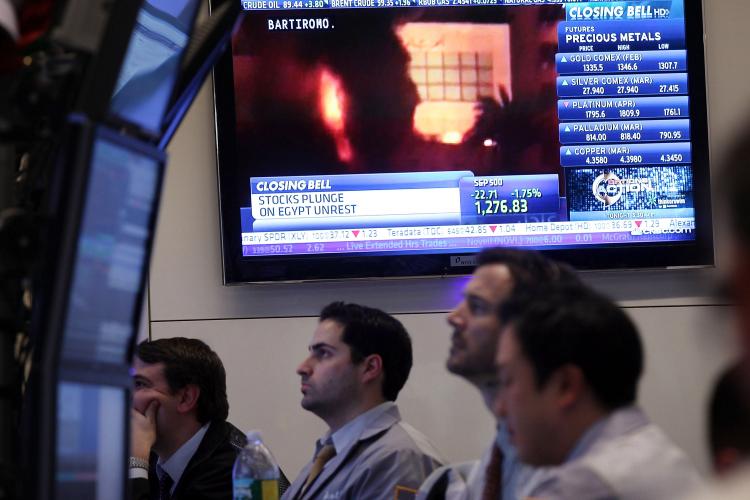NEW YORK—U.S. stock markets closed sharply lower in New York last Friday, as political and social unrest in the Middle Eastern nation of Egypt unnerved investors.
Geopolitical uncertainty shook the markets, sending the Dow to its first weekly loss in eight weeks.
The S&P 500 Index tumbled at the highest rate since August 2010, sliding 23.2 points, or 1.8 percent, to 1,276.3 points. The Dow Jones Industrial Average fell 1.4 percent to 11,823.7 points. The technology-heavy Nasdaq Composite Index dropped 2.5 percent to settle at 2,686.9 points.
Tensions in Egypt, one of America’s biggest and most stable allies in the Middle East, overshadowed positive news that the U.S. economy grew at a faster pace.
The instability increased the CBOE Volatility Index VIX, which measures stock investors’ fear (volatility). The uncertainty drove up selloffs, as 9.97 billion shares exchanged hands on the New York Stock Exchange, the highest volume of 2011.
The news out of Middle East also sent European shares lower. The London FTSE 100 Index fell 1.4 percent, while the CAC dropped 1.9 percent.
GDP Higher
Egyptian news offset positive developments in the U.S. economy—the U.S. GDP growth accelerated in the fourth quarter, expanding by an annualized rate of 3.2 percent, up from 2.6 percent in the prior quarter.
The GDP growth was fueled by higher than expected consumer spending in the fourth quarter as manufacturing firms cut their inventories, signaling more production in the coming months.
Consumer spending was up 4.4 percent in an annualized basis, and the United States also cut its trade deficit, with exports surging 8.5 percent and importing dropping 13.5 percent.
Ford Earnings Disappoint
In addition, disappointing results from Ford Motor Co. and Amazon.com also dragged U.S. markets lower on Friday.
Shares of Ford (NYSE: F) slumped 13.4 percent last Friday.
Ford, a Wall Street darling in recent months, reported $6.6 billion in profits in 2010, its highest ever, the company said last Friday. That figure more than doubles the $2.7 billion it made in 2009.
Unfortunately, its fourth quarter earnings of $190 million (5 cents per share) were 79 percent lower than the profit it made during the same quarter in 2009, and missed analyst estimates.
Ford said that it missed earnings targets due to higher costs in the United States—such as oil and steel—and a loss in its European operations. “Lower market share, higher structural costs to support product launches, higher commodity costs, and lower industry volume” contributed to its loss in Europe, according to a statement from Ford.
In addition, the company had to invest heavily in launching new versions of three of its most popular models, the Ford Explorer SUV, F-150 pick up truck, and Ford Focus compact car.
The company also said that higher commodity prices cut into margins. Ford made a margin of $1,130 on each vehicle produced last quarter, far lower than previous quarters.
“Costs increased by $900 million… [due to] higher structural costs to support product launches and growth of our product plans, higher commodity costs, and higher costs related primarily to the recently announced Windstar Field Service Action in North America,” said Lewis Booth, Ford’s chief financial officer.
Amazon Misses Target
Amazon.com, the internet’s biggest retailer, saw its shares (Nasdaq: AMZN) slump 7.2 percent last Friday on the Nasdaq Stock Exchange.
The retailer reported fourth quarter earnings in line with Wall Street analyst expectations, but revenues fell short of forecast. In addition, the company said that first-quarter earnings might miss analysts’ targets.
Nevertheless, Amazon’s growth has been impressive since the Seattle-based company’s modest beginnings as a web bookseller. The web retailer announced profits of $416 million on revenues of $12.95 billion last quarter. Once again, the Kindle e-book reader was a top seller for the holidays.
“We had our first $10 billion quarter and... Kindle books have now overtaken paperback books as the most popular format on Amazon.com,” said Jeffrey Bezos, Amazon’s CEO, in a statement.
For the first quarter of 2011, Amazon forecasts earnings of between $260 million and $385 million, on sales of a little more than $9 billion. The estimates are below those estimated by analysts surveyed by Bloomberg.
The company is also looking to grow by acquisitions. Amazon recently acquired web retailer Diapers.com.





